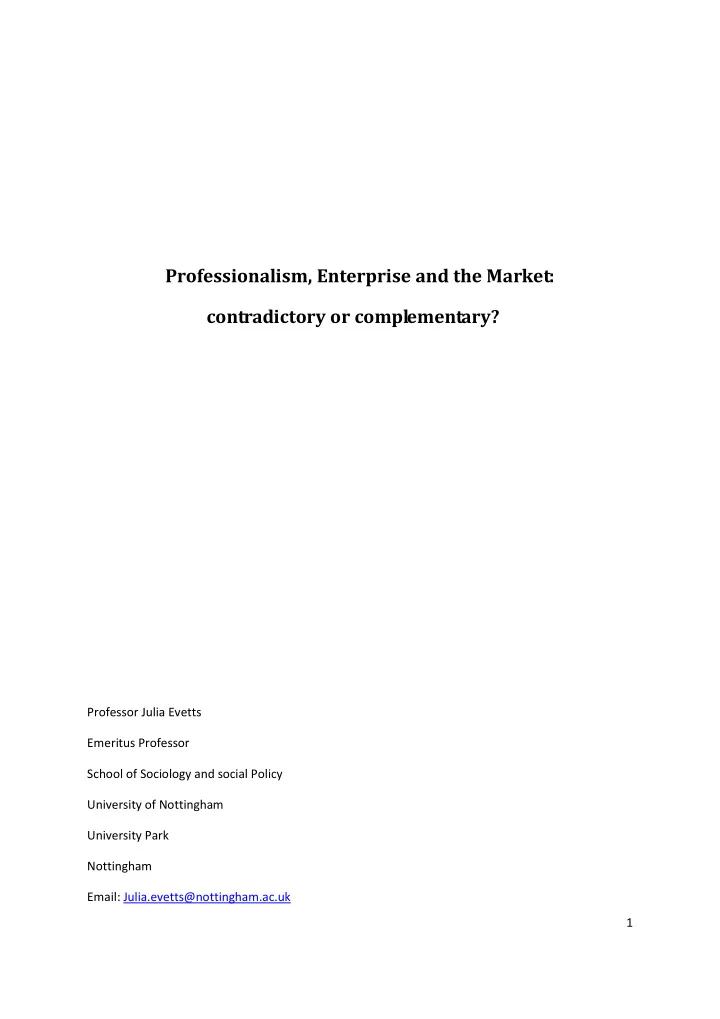

Professionalism, Enterprise and the Market: contradictory or complementary? Professor Julia Evetts Emeritus Professor School of Sociology and social Policy University of Nottingham University Park Nottingham Email: Julia.evetts@nottingham.ac.uk 1
Presentation Summary: In the first section the concept of professionalism is summarised as both an occupational and normative value and as an ideology; The second section considers the arguments for regarding professionalism and enterprise as contradictory and as alternative ways of organizing work; Section three considers the arguments for the consolidation of enterprise and professionalism and under what conditions the two might be complementary; A few tentative conclusions are made. 2
Professionalism as a Normative and Occupational Value Occupational control of the work and work processes and systems; Professionalism as a discourse: as a positive, as good practice which always put the users (customer, client, patient, student) first; Practitioners as experts in their fields; Practitioner/user relationships based on trust and competence; Professionalism as important for the stability and civility of social systems (e.g. as a force capable of subjecting rampant individualism to the needs of the community). (Plus ideological components). 3
Ideology of Professionalism control of the work systems, processes, procedures, priorities to be determined primarily by the practitioner/s; professional institutions/associations as the main providers of codes of ethics, constructors of the discourse of professionalism, providers of licensing and admission procedures, controllers of competences and their acquisition and maintenance, overseeing discipline, due investigation of complaints and appropriate sanctions in cases of professional incompetence; collegial authority, legitimacy, mutual support and cooperation; common and lengthy (perhaps expensive) periods of shared education, training, apprenticeship; development of strong occupational identities and work cultures; strong sense of purpose and of the importance, function, contribution and significance of the work; discretionary judgment, assessment evaluation and decision-making, often in highly complex cases, and of confidential advice-giving, treatment, and means of taking forward; trust and confidence characterize the relations between practitioner/client, practitioner/employer and fellow practitioners. 4
The Contradictions 1. The power of the state 2. The growth of welfare professions 3. Logics of enterprise, the market and consumerism 4. Logics of management; audit and performance indicators replace trust. 5
Complementarity 1. New forms, strategies and tactics 2. Mutually reinforcing (Adler et al 2008) Hybridity (Faulconbridge and Muzio 2008) Market pressure can lead to more team and co-operative working 3. New management forms 4. Management as a career and status strategy 5. Organizations as sites for professional control and domination as well as competitions over expertise (Muzio and Kirkpatrick 2011). 6
Conclusions 1. Occupational values of professionalism used to promote enterprise and efficient management of the organization. 2. Some of the challenges to professionalism as an occupational value might also constitute challenges to enterprise and a culture of enterprise. 3. The logics and culture of professionalism and enterprise are, at the same time, both similar and yet different; complementary and contrasting. 4. If professionalism and enterprise are to be reconciled then the organizational constraints to both would need to be recognised. 7
Recommend
More recommend